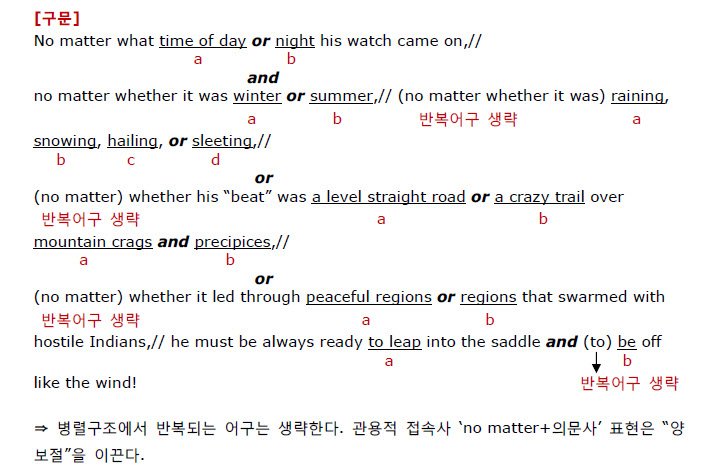등위(병렬)관계란 and, but, or 등의 등위접속사나 both A and B와 같은 상관접속사를 이용해 단어와 단어, 구와 구, 절과 절을 동등하게 연결하는 것을 말한다.
다음 지문을 해석하시오.
No matter what time of day or night his [the pony express rider’s] watch came on, and no matter whether it was winter or summer, raining, snowing, hailing, or sleeting, or whether his “beat” was a level straight road or a crazy trail over mountain crags and precipices, or whether it led through peaceful regions or regions that swarmed with hostile Indians, he must be always ready to leap into the saddle and be off like the wind! –Mark Twain’s Roughing It
[해설] his [the pony express rider’s] watch came on ‘그의 시계가 온다’ 라는 뜻은 그의 근무시간이 시작된다는 의미다. No matter what time of day 부터 ~ with hostile Indians 까지가 종속절이며 he must be always 이하가 주절이다.
[어휘] pony express rider (미국 서부 개척 시대의) 조랑말 속달 우편 배달부 / hail 우박 / sleet 진눈깨비 / beat 맥박, (음악 등의) 박자, 관할 구역 / trail 흔적, 오솔길[산길] / crag 험준한 바위 / precipice 벼랑 / swarm n. 무리 v. 우글거리다 / hostile 적대적인 / saddle (말에 얹는) 안장 / be off 떠나다
[해석] 비록 시간이 하루 중 어느 때 속달 우편부의 근무시간이 돌아오건, 겨울이건, 여름이건, 비가 오건, 눈이 오건, 우박이 내리건, 진눈깨비가 내리건, 자신의 관할 구역이 평지이건, 험준한 바위산과 절벽을 넘는 산길이건, 혹은 평화로운 지역을 지나건, 적대적인 인디언이 우글거리는 지역을 지나건, 그는 항상 (재빨리) 안장에 뛰어 올라 바람처럼 떠날 준비가 되어 있어야 한다!


※ 강의하면서 마지막 부분에 실수한 것을 바로 잡습니다.
be off like ~는 to leap ~ 병렬구조입니다. 강의에선 실수로 must be와 be off 부분이 병렬구조라고 말함.
다음 글의 밑줄 친 부분 중 어법상 틀린 것은?
Some scientists have focused their studies on how domestication changes the behavior of animals. Taking an animal from the wild and placing it in captivity ① constitutes a relatively major change in the animal’s environment. In captivity, animals ② that are usually protected from natural predators, food and water are readily accessible year-round, and groups of animals are often confined to small spaces. Consequently, certain traits ③ selected for in nature are no longer selected in captivity and other behavioral characteristics become more important. These changes in natural selection (in captivity) can ④ result in genetic changes affecting behavior. One important evolutionary change ⑤ accompanying the domestication process is a reduction in fearfulness of strange or novel objects. This makes good sense since unfamiliar objects in nature are often dangerous (e.g. a predator, toxic food), whereas in captivity, strange objects usually do not jeopardize survival.
[해석] 몇몇 과학자들은 가축화가 동물의 행동을 어떻게 변화시키는지에 대해 연구를 집중해왔다. 야생으로부터 동물을 데려다가 사육시키는 것은 그 동물의 환경에 상대적으로 큰 변화를 가져오는 것이다. 사육되는 상태에서 동물들은 자연 속의 포식자로부터 보호를 받게 되고, 먹이와 물을 일 년 내내 쉽게 얻을 수 있으며, 무리를 이루어 종종 작은 공간에 갇혀 지내게 된다. 결과적으로, 자연의 법칙에 따라 선택된 특성들이 사육의 상태에서는 더 이상 선택되지 않고, 다른 행동적 특성들이 더 중요하게 된다. (사육에 따른) 이러한 자연 선택의 변화는 행동에 영향을 미치는 유전적 변화를 초래할 수 있다. 가축화의 과정에 수반되는 한 가지 중요한 점진적인 변화는 낯설고 새로운 대상에 대한 두려움이 줄어드는 것이다. 이것은 일리가 있는 이야기인데 왜냐하면 자연에서는 낯선 대상이 종종 위험한 존재이지만 (가령, 포식자, 독이 있는 음식), 사육되는 상태에서는 일반적으로 낯선 대상이 생존을 위협하지는 않기 때문이다.
[해설] 정답 ②
각각의 독립절을 등위접속사로 연결한 것이므로 관계대명사 that을 제거해야 한다. 아래 구문 참조.
[어휘] domestication 가축화 / captivity 감금, 억류 / predator 약탈자, 육식 동물 / readily 쉽사리 / be confined to ~에 제한되다 / trait 특성, 특색 / natural selection 자연 도태, 자연 선택 / evolutionary 진화의 / novel 새로운 / jeopardize 위태롭게 하다



